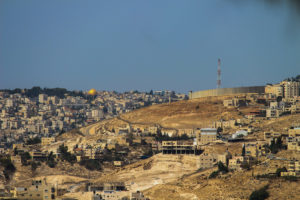
By Bashar Nayfeh – Own work, CC BY-SA 4.0, https://commons.wikimedia.org/w/index.php?curid=73232226
In 1986, during the first of the two trips we took to Israel/Palestine together, my husband Shel and I waited for the bus from Bethlehem back to Jerusalem. We had a choice of two buses: the Jewish bus and the Arab bus. We stood between the clumps of Jews and Arabs, each of whom were waiting for their bus, and I remembered feeling as if I wasn’t in Bethlehem, birthplace of Jesus, but in Alabama before de-segregation. We were Jews, but we were also New Yorkers, so we were going to take whichever bus came first.
When the Arab bus arrived, all the Jews stood back. Only men and women in flowing robes and headgear got on. We followed behind like stowaways. The bus was crowded, but an old man offered Shel (who was in his 20s at the time) his seat–insisted on it. Someone asked where we were from. Obviously somewhere else, or we would have known we’d taken the wrong bus, even though it was going where we wanted to go. “America,” we said. “Massachusetts.”
“Boston?” Someone had relatives in Boston. “No, a small town.” we said as the bus belched its way back to Jerusalem, getting louder and more crowded, as people shouted in Arabic over our heads. Years later, I tried to learn Arabic from a big orange book and a professor who emphasized the ways words might end differently depending on the situation, not admitting for weeks that this was the classical version of the language and all these endings were dropped in common speech. I had wanted to learn common speech. For years I used to dream of going to villages, trying to make peace in two languages I didn’t speak, so I dropped the course.
I remember wondering why more Jews didn’t take the Arab buses, simply because they might be safer. After all, weren’t the frequent suicide bombers of the 1980s on the Jewish buses? And if some of the Jews had taken the Arab buses, would anyone have offered them a seat? Or did we have special status? Was the label “American tourist,” branded on us by our clothing, or simply because we didn’t know any better and had taken the wrong bus–which in my mind, turned out to be the right bus.
On that trip, we sought out peace activists, including people from Oz v’Shalom, an Orthodox Jewish peace movement, and Neve Shalom/Wahat al-Salam, a mixed community of Israelis and Palestinians who ran educational dialogue programs for children and teens. We stayed with a Palestinian family and made labne, a soft yogurt-like cheese, under the stars. And we stayed for Shabbat with Shel’s religious relatives in a West Bank settlement. Everyone we met, regardless of our differences, treated us with warmth and kindness, piling on food, smiles, hugs.
I’m thinking about this today as I try to make sense of the latest wave of violence in Israel/Palestine, risking the discomfort of potential hate mail as I wade from the comfortable topics of writing, or music, or my sheltered life, into a landmine of emotions and suffering. My sister-in-law and brother-in-law and three of my nieces and their families–people I love–have chosen to make their home in Israel and I fear for their safety and well-being. I’m also grieving for every parent, Palestinian or Israeli, whose children were killed, kidnapped, or are now facing death due to air strikes or lack of food or essential medicines.
The situation is complicated, but war is ugly. It’s the wrong bus. And it’s full of people who, unlike me, didn’t choose to be on it.
